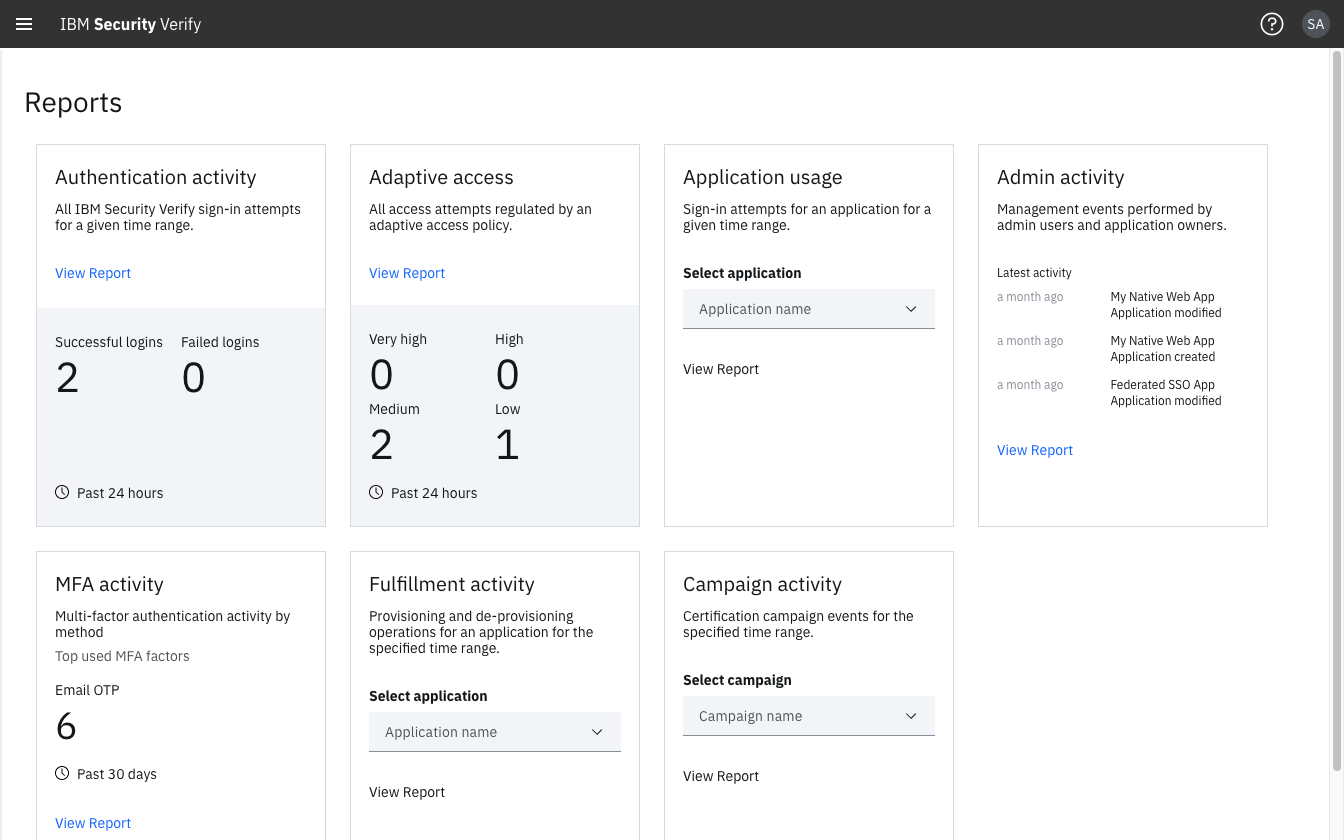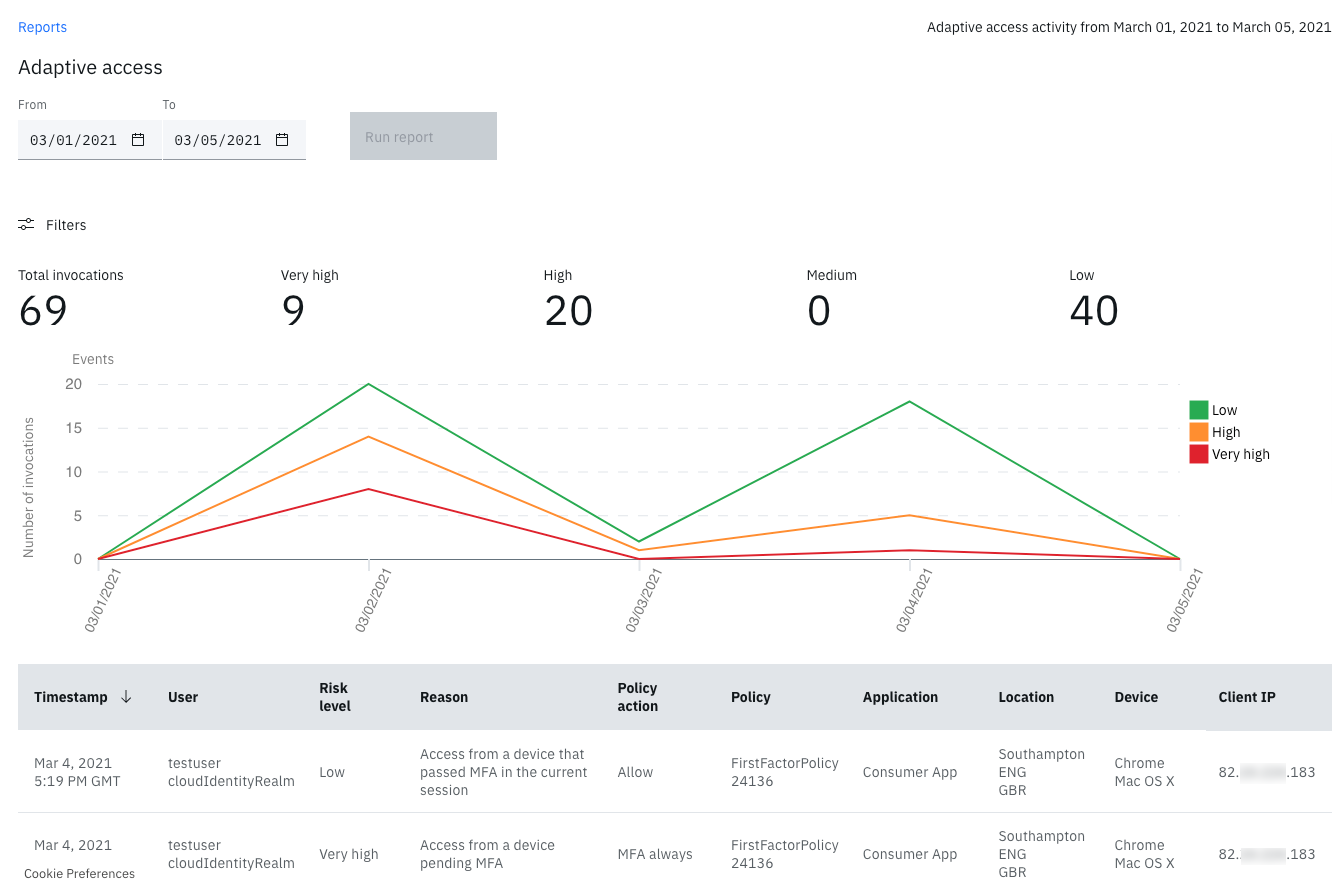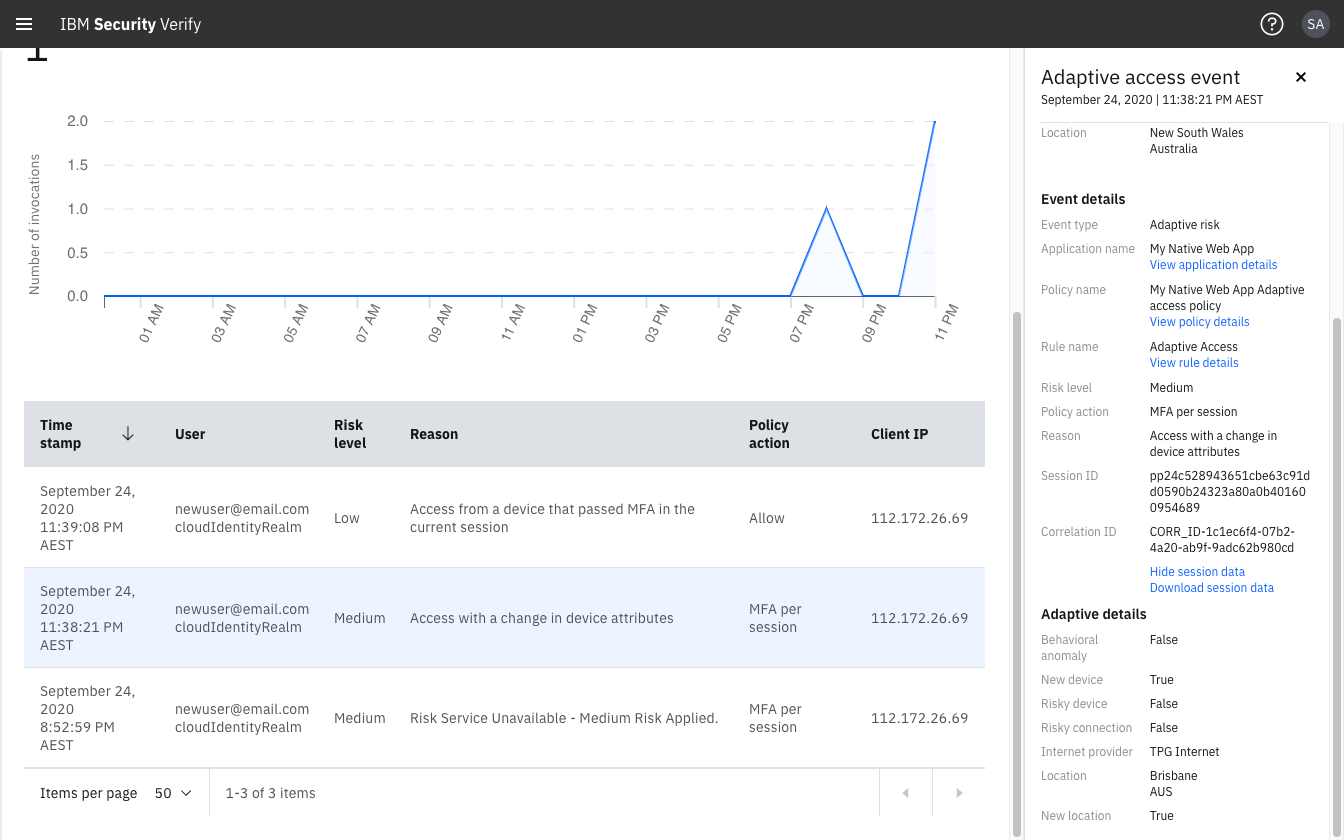Events and Reports
Introduction
This guide describes accessing audited events associated with Adaptive Access and how to interpret the event details.
Adaptive access events are generated when an Adaptive access policy assigned to a native application is invoked for a Policy-based Authentication evaluation.
The event data contains a number of key indicators from the detection, as well as core details of the user, application, access policy and evaluation outcome. Additionally session data and correlation keys are available to assist Support if troubleshooting does not resolve issue.
Collecting the event data during troubleshooting for an unexpected Adaptive access evaluation is used when Obtaining Support.
Adaptive access events can be accessed using
Events service API
The Events service API provides the raw data that is used to generate the Adaptive access reports and can also be used for SIEM integration. Any developer (or user) with an entitled access token can access events using the Events service API.
The Events API is described in the API Reference information.
To receive adaptive access events, use event_type="adaptive_risk" when calling the Events service API.
Obtain an Access Token
Obtain an access token for using an API Client which has manageReports or readReports entitlements. The easiest way to do this is using the Client Credentials OAuth flow.
curl --location --request POST 'https://<tenant_url>/v1.0/endpoint/default/token' \
--header 'Accept: application/json' \
--data-urlencode 'grant_type=client_credentials' \
--data-urlencode 'client_id=xxxxxxxx-xxxx-xxxx-xxxx-xxxxxxxxxxxx' \
--data-urlencode 'client_secret=xxxxxxxxxx'
{"access_token":"ixFpC9ToQmbwDzob280GxYqMko3d7zEFcArUBX1C","grant_id":"2340fa1c-ade9-4dd5-b349-7b5f6af388d4","token_type":"Bearer","expires_in":7200}
Retrieve events
Use the access_token to retrieve the adaptive_risk events.
Optionally you can use a time filter to override the default 24 hour window to limit the results to the known troubleshooting time period.
curl --location --request GET 'https://<tenant_url>/v1.0/events?event_type=\%22adaptive_risk\%22&range_type=time&from=1600869600000&to=1600955999999' \
--header 'Accept: application/json' \
--header 'Authorization: Bearer ixFpC9ToQmbwDzob280GxYqMko3d7zEFcArUBX1C'
{
"response": {
"events": {
"search_after": {
"total_events": 3,
...
... }
...}
},
"success": true
}
Review event detail.
The event JSON contains the details of the Adaptive access policy evaluation and includes the Session ID and Correlation ID.
Key details of the event is described in Adaptive access event data elements.
{
"response": {
"events": {
...
"events": [
{ ... },
{
...
"data": {
...
"applicationid": "4587066640521568871",
"applicationname": "My Native Web App",
"policy_id": "357317",
"policy_name": "My Native Web Adaptive access policy",
"rule_id": "1596095800392",
"rule_name": "Adaptive Access",
"risk_level": "MEDIUM",
"policy_action": "ACTION_MFA_PER_SESSION",
"reason_id": "1003",
"reason": "Access with a change in device attributes",
"csid": "pp24c528943651cbe63c91dd0590b24323a80a0b401600954689",
...
"snippet_id": "511843",
"risk_score": "300",
...
"behavioral_anomaly": "false",
"new_device": "true",
"risky_device": "false",
"risky_connection": "false",
"isp": "TPG Internet",
"city": "Brisbane",
"country": "AUS",
"new_location": "true",
...
},
"year": 2020,
"event_type": "adaptive_risk",
"month": 9,
"day": 24,
"time": 1600954701039,
...
"correlationid": "CORR_ID-1c1ec6f4-07b2-4a20-ab9f-9adc62b980cd"
},
{ ...},
]
}
},
...
}
Adaptive access report
To access the Adaptive access report, refer to Generating an Adaptive Access activity report.
Adaptive access reports are only available in the IBM® Verify administration console, however the readonly group can be used to provide developers access to reports with no permissions to alter configuration.
Members in this group can click Switch to admin to access the administration console from the User home page. They can view information about applications, governance operations, users and groups, reports and configuration.
To enable readonly permissions refer to Managing groups topic in IBM Verify product in the IBM® Knowledge Center.
Navigate to reports
To see the Adaptive access report, navigate to the Reports page in the IBM® Verify administration console.
The Adaptive access tile displays the Risk levels from the past 24 hours:

Report tiles
View report
An Adaptive access report is generated when you select View Report.
You can filter the events returned. For example, setting From and To dates.

Adaptive access report
Review event detail
When selecting an individual row the event detail is displayed.
Key details of the event is described in Adaptive access event data elements.
You can click the Show session data link to display the Session ID and Correlation ID, or
click the Download session data link to export the JSON event data, similar to the JSON from the Events service API detail.

Adaptive access event data elements
The Events service API or an Adaptive access report can both be used to obtain results from an Adaptive access policy invocation.
During troubleshooting, some key details from the event or report include:
- Session ID - For example:
pp24c528943651cbe63c91dd0590b24323a80a0b401600954689.
The session id generated by the Native Web SDK as described in Set up a sample application. - Corelation ID - For example:
CORR_ID-1c1ec6f4-07b2-4a20-ab9f-9adc62b980cd.
Low level request indicator that can be included in the problem detail if troubleshooting does not resolve the issue. - Snippet ID - For example
"snippet_id": "511843"
The snippet id configured for the application or the IBM® Verify tenant host snippet id. - Reason - For example
Access with a change in device attributes.
Refer to Generating an Adaptive Access activity report forReasondescriptions. - Risk level - For example
Medium(Adaptive access report) or"risk_level": "MEDIUM"(Events service API).
The Risk level for the assessment derived from the risk score.
Use the Risk level to correlate to the appropriatePolicy actionconfigured in Adaptive Access Policy for Native applications.
Session ID correlation
When troubleshooting an individual assessment or scenario flow, it important to correlate the Native Web application collection and detection in the browser with the Adaptive access policy evaluation.
The Session ID is available in the:
- Events service API: csid in the event JSON
- Adaptive access report: Session ID in the report detail
- JavaScript console: Web application login page
Updated 7 months ago
